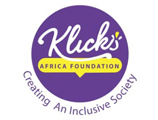ENQUIRY
NANA YAA’S STORY
WHEN LIFE TAKES A SUDDEN TURN!
Written by Mary Amoah Kuffour,
Special needs teacher and a mother of a 15 year old Nana Yaa who has autism.
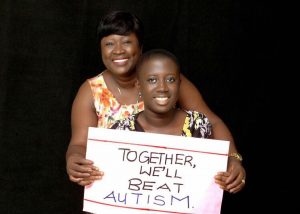 This is my story and journey with Nana Yaa
This is my story and journey with Nana Yaa
The day arrived. I was ready and nicely dressed. My feelings were all mixed up. My inclinations leaned towards the expectation of exactly what I had prayed for. Occasionally, a thin film of doubt would rise and fly across my mind. I would quickly refocus on what I had prayed for-it meant the world to me, and God had had enough trouble to know I wouldn’t take none else for an answer. The scan didn’t take long. “Mrs. Kuffour, it’s a baby girl!” Flashes of pink in all its tints raced across my mind! The excitement I felt was the highest height of emotions that begun some 12 weeks ago. Having had two boys already through Caesarian section within two years, a third child was not part of the plan, but as fate would have it, a cute angel girl had firmly lodged herself in my womb without notice! I bet both God and my girl winked at each other as they watched my reaction and excitement!
After the second trimester, I started visualizing my baby in all the pink dresses I had bought. From ribbons and toys to a thousand trillions of joyful pink moments, my girl and my world were simply heaven on earth. Then suddenly, something unexpected happened; Chicken pox showed up as if to remind and ground my rising joy. This was seven months into the pregnancy. A few weeks to delivery, I got really sick and had frequent visits to the hospital. Finally, on the 17th April 2003, at 1.16 pm through Caesarian section, my baby girl showed up in this beautiful world! Many months of imagined reality had become a baby girl!
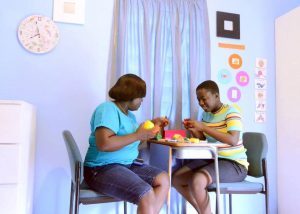 I asked to see my baby. I was told that would be later because she’s at the Intensive Care Unit due to a foetal distress during the delivery process. Five days would pass before I was discharged without my baby. How was I to go home alone without my baby? It didn’t make maternal sense to me. So I decided to stay around the hospital so I could be close. Two weeks that felt more like two years in real terms, would pass before my baby was also discharged. The family reunion and bonding felt like a miracle. We kept our routine checks with the hospital until she was very well and started gaining weight. At one, she started walking and babbling the usual child language to communicate her needs.
I asked to see my baby. I was told that would be later because she’s at the Intensive Care Unit due to a foetal distress during the delivery process. Five days would pass before I was discharged without my baby. How was I to go home alone without my baby? It didn’t make maternal sense to me. So I decided to stay around the hospital so I could be close. Two weeks that felt more like two years in real terms, would pass before my baby was also discharged. The family reunion and bonding felt like a miracle. We kept our routine checks with the hospital until she was very well and started gaining weight. At one, she started walking and babbling the usual child language to communicate her needs.
She grew well until at age three we noticed she would rather pull us towards whatever she wanted, instead of uttering what it was, as has always been the case. She would stare at her fingers for unusually prolonged periods and would spin and jump and play all by herself. She had constipation for days. All this got us worried. We visited many hospitals and churches too in search of a cure. The various doctors we met assured us all would be well and she would resume her normal speech. Our last prayer camp visit was at Mount Herob at Mamfe Akuapem. Nothing changed. We became worried.
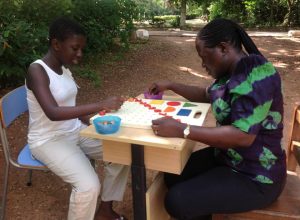 Then one fine day, when she was around six, we had a friend visit us from the USA. This friend was the first to point out autism to us! In the most dramatic denial, we demanded of our friend to speak English to us! What animal is autism? And where did it come from??? We went to see a speech pathologist. Finally we got an official diagnosis that confirmed our friend’s opinion. The drive home from the speech therapist’s office was longer than the nine months I had been pregnant! I felt heart broken, disappointed and cried my heart out! I experienced the worst of the “why me syndrome” and wondered what society would think about me. What did I do wrong? By contrast, my husband never uttered a word. A year that seemed like many decades would pass before I came to terms with my new reality. My life had taken a new turn and I had to deal with it!
Then one fine day, when she was around six, we had a friend visit us from the USA. This friend was the first to point out autism to us! In the most dramatic denial, we demanded of our friend to speak English to us! What animal is autism? And where did it come from??? We went to see a speech pathologist. Finally we got an official diagnosis that confirmed our friend’s opinion. The drive home from the speech therapist’s office was longer than the nine months I had been pregnant! I felt heart broken, disappointed and cried my heart out! I experienced the worst of the “why me syndrome” and wondered what society would think about me. What did I do wrong? By contrast, my husband never uttered a word. A year that seemed like many decades would pass before I came to terms with my new reality. My life had taken a new turn and I had to deal with it!
My first visit to the Autism Centre made me cry. I saw very beautiful kids all affected by autism to various degrees. Aunty Serwaa, the founder of the Autism Centre in Ghana spoke to me. She made me appreciate the fact that I wasn’t alone. However, her assurances did little to resolve the nagging questions on my mind: how do I cope? What kind of future will my daughter have? How come I have this disability in my family? Why me?
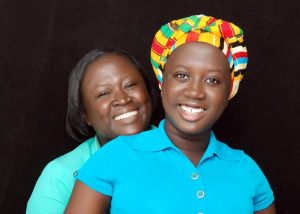 Between my worrying bouts and my daughter, life was moving and I had to move along by taking relevant decisions. I didn’t have the luxury of time. It was a struggle between my husband and I as we decided what would be in the best interest of our daughter: I would stay home. He would work and support us. Occasionally, I would wonder why it wouldn’t be the other way round? He staying home and me working (don’t ask why). This angered me. The more I thought about what she couldn’t do for herself, the more I felt frustrated and deep within me, I hated my own child. This attitude made matters worse for all of us.
Between my worrying bouts and my daughter, life was moving and I had to move along by taking relevant decisions. I didn’t have the luxury of time. It was a struggle between my husband and I as we decided what would be in the best interest of our daughter: I would stay home. He would work and support us. Occasionally, I would wonder why it wouldn’t be the other way round? He staying home and me working (don’t ask why). This angered me. The more I thought about what she couldn’t do for herself, the more I felt frustrated and deep within me, I hated my own child. This attitude made matters worse for all of us.
Back in those very frustrating days, I had met a lady, Nana Akua Owusu, a speech and language therapist. She had invited me to join her newly established centre, AwaaWaa2, a center for children with speech and language difficulties. I met and made a few friends while I worked at the centre. We found strength in our numbers a7nd established a good network that still works well to date. I had friends with similar challenges I could talk to whenever I felt overwhelmed.
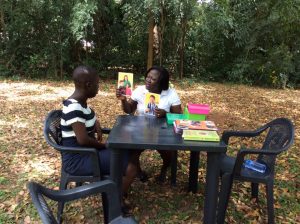 When Nana Yaa was about ten years I joined a 52-parent group for autism online. My association with this groups helped me to understand my daughter’s needs and to appreciate the turn my life had taken. I had explanations to most of my unanswered questions. Some were about why she flapped her hands all the time and why she wanted to go about naked. I learnt about her dietary needs, sensory integration and biomedical interventions that could address underlying issues. Autism A Mothers Support group was another of such groups. During my interactions I was introduced to the Sonrise Program. I finally gained a scholarship to go for the startup training in Massachusetts. Through the training program, I finally reached a level of acceptance where I could choose to be happy with my life and its new challenge. I formed a loving attitude and appreciation for my daughter. Those weeks were so refreshing and it renewed my hope and revived faith and joy. I was in a good place and a great future looked so clear.
When Nana Yaa was about ten years I joined a 52-parent group for autism online. My association with this groups helped me to understand my daughter’s needs and to appreciate the turn my life had taken. I had explanations to most of my unanswered questions. Some were about why she flapped her hands all the time and why she wanted to go about naked. I learnt about her dietary needs, sensory integration and biomedical interventions that could address underlying issues. Autism A Mothers Support group was another of such groups. During my interactions I was introduced to the Sonrise Program. I finally gained a scholarship to go for the startup training in Massachusetts. Through the training program, I finally reached a level of acceptance where I could choose to be happy with my life and its new challenge. I formed a loving attitude and appreciation for my daughter. Those weeks were so refreshing and it renewed my hope and revived faith and joy. I was in a good place and a great future looked so clear.
The first few months of the program saw a huge progress in Nana Yaa such as improved eye contact and greater social skills. She became very happy because of our acceptance. At 12 she surprised us with some words and used them in their right context too! It was a miracle to hear her use basic words and phrases like “water”, ” bye bye”, “I’ll go with you” “wee wee” etc. Additionally, she could say where she lives.
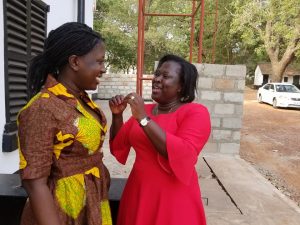 Parents like me have had to face several challenges. Some of the common ones are social. This area was for me, the biggest challenge- not being able to take your child wherever you wanted, and having to find non-existent explanations to questions from friends, family and strangers. The “what do people think about me” syndrome was not only peculiar to the Christ. All people suffer it at different times and to varying degrees in life. I have learnt to determine how frequent or otherwise I would bear this social burden. Other challenges are financial. The cost of therapy is high. Still others are the toll it takes on relationships and marriage. We are not there yet, but admittedly, we have made tremendous improvements for which I am truly grateful.
Parents like me have had to face several challenges. Some of the common ones are social. This area was for me, the biggest challenge- not being able to take your child wherever you wanted, and having to find non-existent explanations to questions from friends, family and strangers. The “what do people think about me” syndrome was not only peculiar to the Christ. All people suffer it at different times and to varying degrees in life. I have learnt to determine how frequent or otherwise I would bear this social burden. Other challenges are financial. The cost of therapy is high. Still others are the toll it takes on relationships and marriage. We are not there yet, but admittedly, we have made tremendous improvements for which I am truly grateful.
It has been a rollercoaster journey. My ideas of who I am have been challenged. My strengths and weaknesses exposed, and my view of life and the world veritably expanded. As I reflect, I realize that much of the pain I suffered had to do with my own mind set. I had no framework or perspective from which I could appreciate the uniqueness of my daughter. In my “normal” expectation, she was different from what I thought, and by extension, what society thinks of as a normal human being. I realized that society, in wanting everybody to be the same, subtly conditions us to become handicapped and disabled in our minds and hearts.
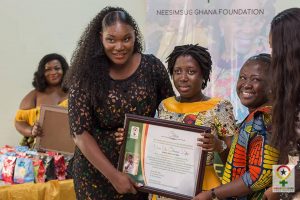 We therefore lack the mental framework to accommodate how differently others choose to express their lives here. Ours is a social attitude that accepts the validity of a person’s humanity on grounds of sameness. Anyone who appears different is looked upon as a biological deviation. Nothing could be more debilitating than such a mental disability. Looking back, I realized that as soon as I adopted a healthy mindset and attitude, my daughter’s situation began to improve.
We therefore lack the mental framework to accommodate how differently others choose to express their lives here. Ours is a social attitude that accepts the validity of a person’s humanity on grounds of sameness. Anyone who appears different is looked upon as a biological deviation. Nothing could be more debilitating than such a mental disability. Looking back, I realized that as soon as I adopted a healthy mindset and attitude, my daughter’s situation began to improve.
Nana Yaa is still the cute angel who lodged in my womb some 14 years ago. The disability I thought was in her, was apparently my own.
Mary is also An Early Interventionist and Coordinator at AwaaWaa2. You can reach her: maryamoah01@yahoo.com

